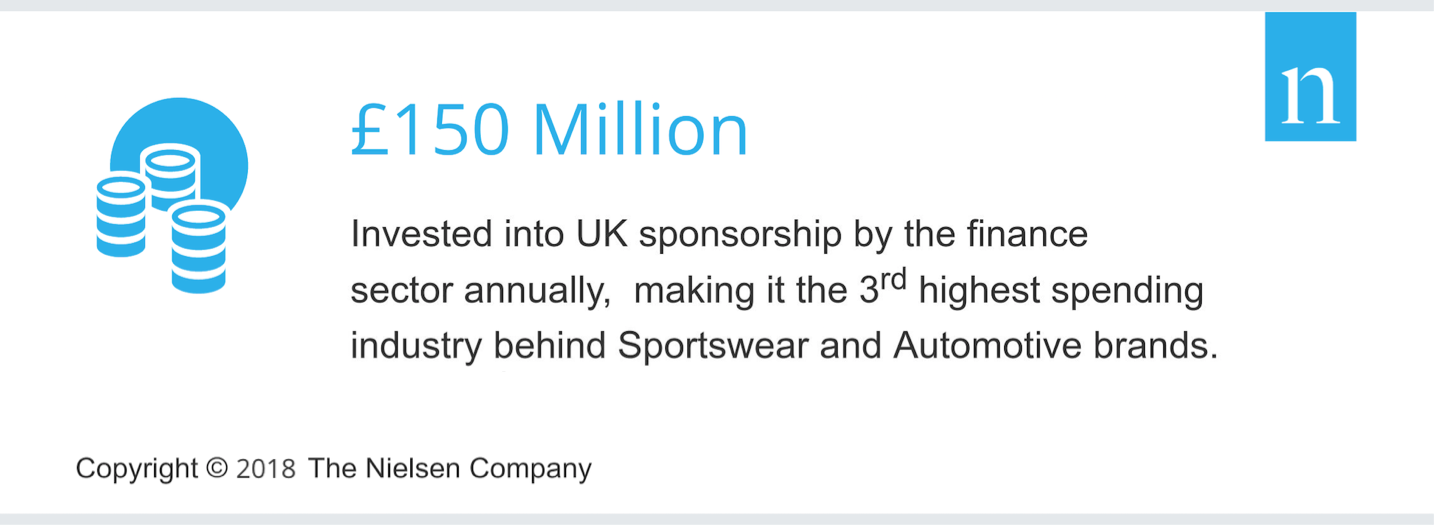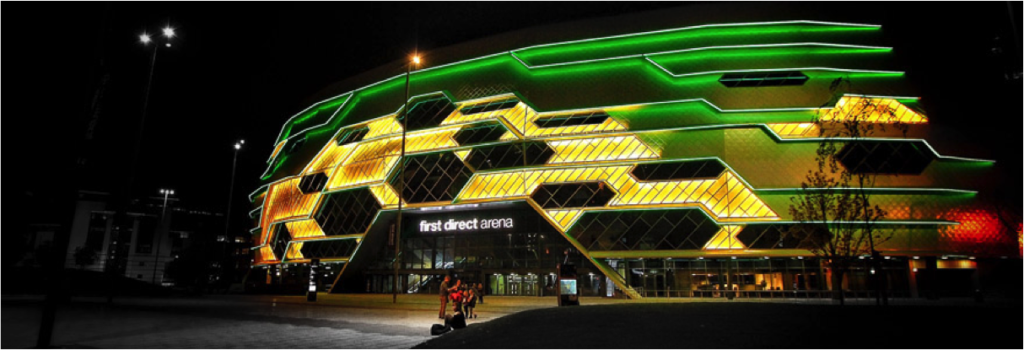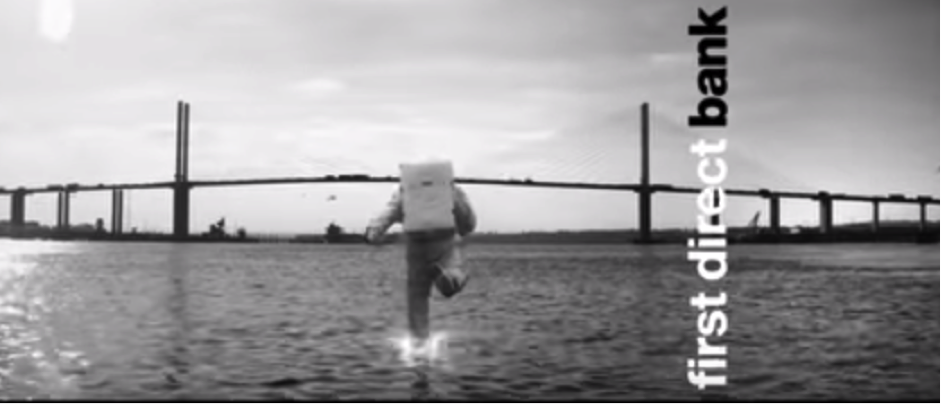There has always been a strong tradition of sponsorship amongst companies in the financial sector. It is estimated annually that the finance sector invested over £150m into UK sponsorship, making it the 3rd highest spending industry behind Sportswear and Automotive brands.

Sponsorship is an attractive proposition for financial firms as it allows them to associate their brand with key attributes that are aligned to their brand strategy. In a world that revolves around complex services such as current accounts, credit cards and mortgages (which, let’s be honest aren’t the most thrilling of services!) – sport, art and culture allow finance brands to connect with their customers’ passion points and communities in a much more engaging way.
It also allows them to tackle issues such as lack of consumer trust and negative brand perceptions – research from PwC shows fewer than one in three customers now trust their bank, yet switching levels remain relatively low. However, sponsorship has the power to help financial brands differentiate themselves from the competition through emotional connection – CSR initiatives and grass roots programmes also allow brands to impact at a local level, closer to home, often away from the major sporting stage.
CAN SPONSORSHIP IMPACT CONSUMER BEHAVIOUR?
Our historic data also proves that sponsorship can help to improve customer perception of financial brands. Sport sponsorships can lend financial brands key traits such as trust, passion and excitement. It is these key points of differentiation that financial brands rely on to push them into the consideration set for consumers for when they make their next product decision (although ultimately it may be rational reasons that define the ultimate choice, e.g interest rates, customer service).
There are also a host of more tangible reasons why financial brands invest in sport. Access to hospitality allows them to entertain key clients and high net worth customers in an exclusive environment. There is also the opportunity to generate direct revenue from rights holders who themselves have numerous financial needs such as funding stadium developments or handling transactions. On the face of it, sponsorship is a no-brainer for the financial sector.
However, if you look at the UK sponsorship landscape, from a financial perspective it’s a very cluttered space. Brands in this sector tend to gravitate towards Rugby Union, Golf and Cricket (~£100m spend on these 3 sports), creating a very difficult environment for clear differentiation and cut-through. For example, in UK Rugby Union, there are 53 different financial brands competing for share of voice and customer loyalty. This, combined with a stronger spotlight on hospitality and entertaining, makes delivering an innovative and engaging sponsorship a tough ask.
BRITISH ONLINE RETAIL BANK FIRST DIRECT
One of the brands who have taken this challenge head-on is British online retail bank first direct.

In 2013, they signed a five-year naming rights sponsorship deal with a major new music venue in Leeds. It was the company’s first significant sponsorship agreement and was driven in part by the company’s Yorkshire headquarters but also to address some key challenges. Prior to the sponsorship, the bank identified that its customer base was getting older and concentrated in the South East of England. This led to several objectives being set which included:
- Creation of a physical touchpoint that allowed people to engage with the bricks and mortar of first direct – important for a bank with no branches!
- Reach a younger demographic with a proposition developed around their passion points.
- Develop a more geographically diverse footprint of customers.
Graham Smith who leads first direct’s sponsorship of the arena is very clear on why the sponsorship is such a good fit for the bank, and how it performs so well for them,
“As an online business, our partnership with the arena gives us the physical touch point we need with customers and the wider community. The arena fits perfectly with their brand values (dare to be different, always on it, uncommonly good sense and we take money seriously, not ourselves) and the breadth and type of events reflect their brand image.”
The first direct Arena has been designed specifically for entertainment and music events. The range of events supports the bank’s national exposure and awareness with headline event such as the BBC’s Sports Personality of the Year show, the opening ceremony of the Tour de France and Britain’s MOBO Awards.
Graham adds,
“Music and events provide the right platform to engage both customers and employees inspired by our values. Through our innovative branding and communication campaign, we live and breathe these values every day through the venue and the events that take place here.”
first direct complemented its sponsorship rights with a major advertising campaign around the city, to help connect with a broader demographic range.

In addition to the branding assets at the venue, first direct has also benefited from online and print coverage and even exposure on road signs across the city. All these elements are quantified via a valuation framework that allows first direct to understand the value of both the tangible and intangible assets they receive as part of the partnership.
All well as the branded assets in and around the arena, the bank also activates a tailored communications campaign to its customers such as the ‘Surprise and Delight’ initiative where a customer ringing to check their balance may be offered tickets to a show. The results have been impressive.
One-third of the 25-34 age group identified as responding well to first direct’s association with music have stated they are more likely to bank with the company. And despite the company advertising mainly in the south of England, the rate of new customer acquisition in Yorkshire has been two and a half times higher than the national average; the figures correlate with the timing of the arena opening. Despite the arena being in Leeds and two-thirds of first direct’s customers located in the south east of England, ticket giveaway promotions have seen over 70 per cent of entries coming from the south.
In terms of people visiting the first direct Arena, more and more people are being engaged each year. According to the End-of-Year Pollstar rankings, the arena is 13th in the world when it comes to ticket sales hosting nearly 675,000 fans in 2017 – up by 80% from 2016. To put this in a global context, it ranks one place higher than the AccorHotels Arena in Paris and two places higher than the Ziggo Dome in Amsterdam.
Graham added,
“When we started the partnership in 2013, we thought it had potential to do great things for our business and become a focal point for our employees, our customers and the North-west. Today we see the partnership achieving this and much much more…”
Sponsorship is, and will continue to be, an integral part of the financial service industry. The challenge as we head towards 2018 will be how brands in this sector develop their approach to reflect the saturated nature of the landscape, and engage with target consumers in fresh and innovative ways. Maybe we will see others following first direct’s lead and harnessing the power of an entertainment venue to make themselves stand out from the crowd.